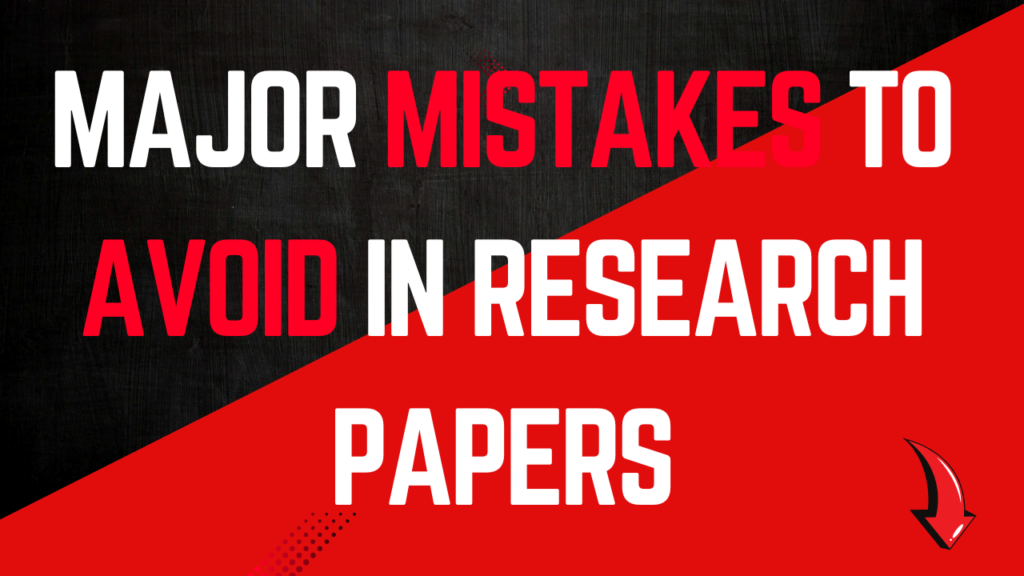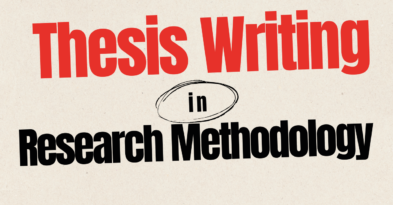16Dec

Research papers are the backbone of academic progress, showcasing your hard work and contributing to the body of knowledge in your field. However, even the most promising research can lose its impact due to avoidable mistakes. Here, we highlight the most common errors and provide tips on how to steer clear of them.

One of the fundamental mistakes researchers make is failing to define a clear research question or hypothesis. Without a focused objective, the paper can appear scattered and lack direction.
Solution: Start with a well-defined research question. Use the SMART framework (Specific, Measurable, Achievable, Relevant, Time-bound) to craft a precise objective.
A weak or incomplete literature review can undermine your research’s credibility. Skipping key studies or relying on outdated references fails to provide a solid foundation for your work.
Solution: Conduct a thorough review of recent and relevant literature. Utilize tools like Google Scholar, Scopus, or Web of Science to ensure you’ve covered all significant sources.
Plagiarism, whether intentional or unintentional, can lead to severe academic repercussions. Similarly, ethical lapses in data collection or reporting can damage your reputation.
Solution: Use plagiarism detection tools like Turnitin or Grammarly’s plagiarism checker. Follow ethical guidelines meticulously when collecting and reporting data.
Failing to choose or properly execute a methodology can make your research invalid. An inconsistent approach confuses readers and affects reproducibility.
Solution: Select a methodology that aligns with your research objectives. Clearly document all steps to ensure transparency and reproducibility.
Improper or insufficient data analysis can weaken your findings. Errors in statistical tests or misinterpretation of results often lead to flawed conclusions.
Solution: Use appropriate statistical tools and software (e.g., SPSS, R, or Python). Seek assistance from a statistician if needed, and double-check all calculations.
A disorganized paper with inconsistent formatting can frustrate reviewers and reduce readability. Ignoring journal-specific guidelines is a critical error.
Solution: Follow the target journal’s formatting and submission guidelines. Use tools like LaTeX or Microsoft Word’s templates to streamline formatting.
Using overly technical terms and convoluted sentences can alienate readers and obscure your main points.
Solution: Write for your audience. Simplify language wherever possible and ensure your paper is accessible to both experts and non-experts in your field.
Disregarding feedback from peers or journal reviewers can lead to repeated rejections. Constructive criticism is essential for improvement.
Solution: Carefully consider all feedback. If you disagree with a comment, provide a clear, evidence-based explanation in your response.
A poorly written abstract and conclusion can fail to capture the essence of your research. These sections are critical for making a strong first and last impression.
Solution: Write the abstract and conclusion after completing the paper. Summarize the key findings and their implications clearly and concisely.
Typos, grammatical errors, and awkward phrasing can diminish the professionalism of your paper. Skipping this step often results in avoidable mistakes slipping through.
Solution: Proofread your paper multiple times. Use tools like Grammarly or the Hemingway App for grammar checks, and consider hiring a professional editor.
Writing research papers is a meticulous process, and avoiding these common mistakes in research papers can significantly improve your chances of publication. By focusing on clarity, consistency, and adherence to ethical guidelines, you can create a paper that stands out in academic circles.
For professional assistance with editing, formatting, or plagiarism checks for research papers, reach out to trusted academic services like Kenfra Research. Ensure your hard work gets the recognition it deserves.
International Conference on Engineering Education The International Conference on Engineering Education is a prestigious and globally recognized event that serves as... read more

Plagiarism checking is a serious part of academic life, especially for PhD researchers. Before submitting a thesis, research paper, or... read more

Completing a PhD thesis is a monumental task. It’s not just about writing; it’s about writing well, writing consistently,... read more

Submitting your thesis marks one of the most important milestones in your academic journey. Whether you are pursuing a master's... read more
Building Your Engineering PhD in India: Unleash Your Research Potential with Kenfra Research Aspiring PhD scholars in engineering in India,... read more
Engg teachers demand educational leave without bond conditions: Engineering teachers are advocating for educational leave without being subjected to bond conditions.... read more
Students may be barred even on basis of their post-exam analysis Introduction:When educational institutions decide to bar students from engaging in... read more
Researchers win $700k prize for using AI to read ancient scroll A team of researchers has been awarded a prestigious... read more

Thesis writing is an integral part of any academic journey, particularly for PhD and master's students. It is a... read more
WhatsApp us
Leave a Reply